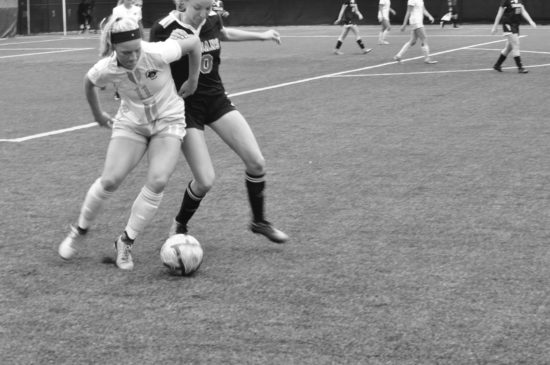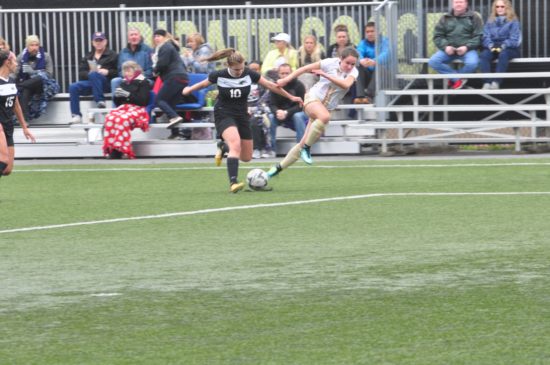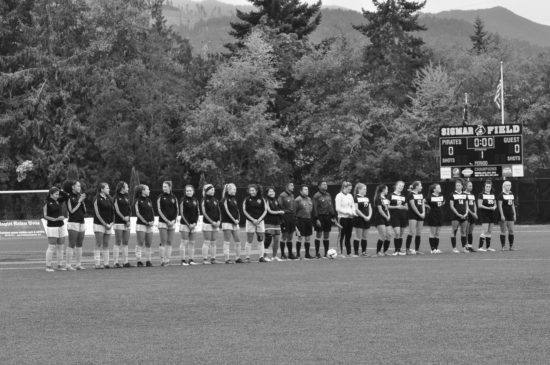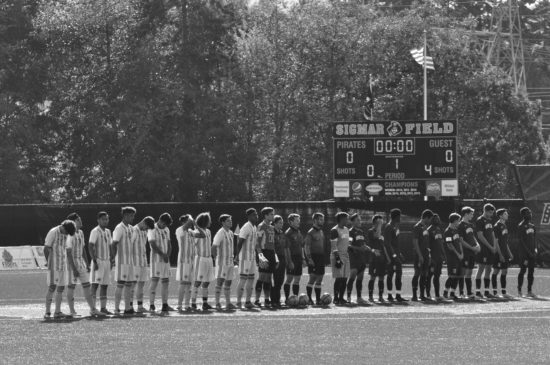
By Ryan Fournier




The expressions of protest taking place in professional sports, though setting off much public controversy, have not made their way to Peninsula College. “We’re kind of on our own island,” said Malia Brudvik, defender for PC Pirates’ soccer team. “We’re focused on other things, you know, like winning.” No PC athletes have taken a knee during the National Anthem, nor have any refused to be present for it at matches.
During the NFL preseason of 2016, Colin Kaepernick began protesting what he saw as racial injustice in America by sitting down, and later kneeling during the playing of “The Star Spangled Banner” at the opening of games, while others stood with their hands over their hearts, as per NFL tradition. Afterward, a broad public drama unfolded, raising passions both for and against Kaepernick’s protest, joined by people inside and outside the NFL. The debate that started as a call for ra- cial justice has, in many circles, become a debate over respect for the American flag and national anthem. It’s raised ques- tions of where, when, and how it’s appro- priate to express one’s social views. The National Football League, as high profile and influential a sports arena as any, is preparing to declare an official position on athlete protests.
Though the athletes have made no show of protest, some say they are behind the movement.
Men’s basketball player Elijah Williams supports the demonstrations, saying racial inequality is old in America, and should be left behind. The point/shooting guard said the displays are an appropriate alternative to violence in response to injustice. Plus, he pointed out, they’ve gotten a conversation going. “It’s obviously effective if we’re all talking about it, whether you agree with it or disagree with it,” said Williams.
Kelly Kevershan, Pirates soccer midfielder, said she believes in the cause, but feels it wouldn’t be appropriate for a white person to take a knee. “As a white person, I don’t want to make it about me. I would do it to support someone on my team.”
PC’s Athletic Department has not taken an official stance on the protests, according to coaches and the associate dean for athletics, Rick Ross. Faculty, along with PC’s athletes, said there’s been no serious discussion about the movement this season, though it has come up in the past. In the wake of 2016 season protests, Men’s Basketball Head Coach Mitch Freeman, and Women’s Head Coach Alison Crumb, used the issue as a “teaching moment,” according to Freeman. After consultation with Ross and Jack Huls, vice president of student services, a speaker was brought to PC to talk to student athletes.
Eric Davis, professor at Bellevue Community College, discussed the protests along with other issues facing society and students. Yamilei Rodriguez, combination forward for women’s basketball, remembered Davis discussing the influential role athletes play in society, and highlighting the importance of following one’s own heart.
Freeman said it gave athletic staff a chance to “have an intimate conversation” with student basketball teams. Crumb spoke firmly of her and Freeman’s philosophy of openness. “We don’t want to ignore it, we don’t want to avoid it, and we don’t want to not support our players and our students.”
Last year’s women’s basketball team was very much in support of the protests, remembered Crumb, but decided not to participate for various reasons. Crumb said players were hesitant to offend locals who support the team. “Traditions die hard in a small town,” she said of Port Angeles. She pointed out that players feared their scholarships might be threatened. She said players felt that, as small town college athletes, their message wouldn’t get far. If the players platform were more visible, Crumb figures they would’ve demonstrated, despite fears of backlash.
Both Freeman and Crumb said it’s not for them to stop athletes from expressing themselves in protest if they wish to do so. “That’s not my job,” said Freeman. “My job is to educate them, is to help them achieve the goals that they have set forth for themselves, to help them play basketball at this level.”
Jake Hughes, newly appointed head coach of the men’s soccer team, said coaches work closely with the athletic department. He said they, and perhaps PC administration, would need to be consulted before a position could be taken on student protests. He also made an observation similar to Crumb’s, saying PC’s athletes are less likely to demonstrate than higher profile ones.
Kanyon Anderson, women’s soccer head coach, is grateful the controversy hasn’t reached PC. “If I don’t have to address it, I won’t,” he said. Though he supports the movement, as well as players’ ability to express themselves, he’d rather not be the one to allow or disallow it. Anderson said he’s grateful his players don’t have to personally deal with the issue as they go about their season.
Ross’ position as head of PC’s athletic department is one of letting students make their own choices, and offering them guidance from there. “We’re just kind of letting it be organic,” he said. “If our student athletes want to express themselves for a cause, I think they have the right and the ability to do that.” Though, if there arose a student plan to demonstrate during the anthem, athletic staff would probably educate students about society’s varied positions and feelings on the matter, “so that they were fully prepared for whatever response that might evoke,” added Ross. Citing his belief that teams are fragile in terms of personal chemistry, he hopes teams would talk among themselves about any plans to publicly protest, and come to an understanding as a team first.
Ross said he’s made no policy with coaches, or with his superiors at PC in anticipation of student protests.
Though Ross supports spreading awareness of racial injustice, he expressed misgivings about the effectiveness of recent displays.
“It’s an interesting animal, to be honest, as an issue”, he mused. “It’s sadly divided our country, rather than bringing awareness and support for what Colin and others were trying to achieve, in my opinion.” Citing Kaepernick’s influence as a public figure, Ross said he “wished [Kaepernick] would have used a different avenue,” such as talking with police forces, fire departments, kids at community centers, and the media.
Reflecting on the division that’s sprung from it all, Ross wonders what purpose the controversy will serve in the end. “Hopefully some positive change is happening.”
